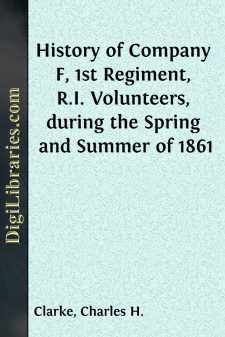Categories
- Antiques & Collectibles 13
- Architecture 36
- Art 48
- Bibles 22
- Biography & Autobiography 813
- Body, Mind & Spirit 142
- Business & Economics 28
- Children's Books 17
- Children's Fiction 14
- Computers 4
- Cooking 94
- Crafts & Hobbies 4
- Drama 346
- Education 46
- Family & Relationships 57
- Fiction 11829
- Games 19
- Gardening 17
- Health & Fitness 34
- History 1377
- House & Home 1
- Humor 147
- Juvenile Fiction 1873
- Juvenile Nonfiction 202
- Language Arts & Disciplines 88
- Law 16
- Literary Collections 686
- Literary Criticism 179
- Mathematics 13
- Medical 41
- Music 40
- Nature 179
- Non-Classifiable 1768
- Performing Arts 7
- Periodicals 1453
- Philosophy 64
- Photography 2
- Poetry 896
- Political Science 203
- Psychology 42
- Reference 154
- Religion 513
- Science 126
- Self-Help 84
- Social Science 81
- Sports & Recreation 34
- Study Aids 3
- Technology & Engineering 59
- Transportation 23
- Travel 463
- True Crime 29
History of Company F, 1st Regiment, R.I. Volunteers, during the Spring and Summer of 1861
Description:
Excerpt
CHAPTER I.
CALL TO ARMS.
Early in the month of April, 1861, several of the Southern States having withdrawn from the Union, forts, arsenals and navy yards within the limits of those States were taken possession of by the Confederate forces. On the 12th of April, Fort Sumter, at Charleston, S. C., was fired upon, and after two days' bombardment by the rebels, commanded by General Beauregard, the garrison, comprising seventy United States Regulars, commanded by Major Robert Anderson, surrendered the fort. Meanwhile the National Capital at Washington was in danger, and on the 15th of April Abraham Lincoln issued his proclamation, calling for seventy-five thousand troops for the defence of the city of Washington.
Governor Sprague, of Rhode Island, tendered the services of one regiment of Infantry, and one battery of Light Artillery, which being accepted by the Secretary of War, the Governor at once sent a telegram to Colonel George W. Tew, commanding the Newport Artillery company, asking how many men of his command would go to Washington for the defence of the Capital. Colonel Tew replied that he would go, with fifty men. April 16th, Colonel Tew received another telegram from the Governor, directing him to recruit his company to one hundred, and to report at Providence, armed and equipped, upon receipt of orders. At that time the Newport Artillery were as well equipped as any company in the State. They were armed with the latest improved Springfield rifles. They had just purchased, at their own expense, fifty artillery sabres of the latest French pattern. They had likewise, the year preceding, had made to their order new military overcoats, which no other company in the State was at that time provided with. These overcoats and sabres were afterwards purchased of them by the State of Rhode Island, and were used for equipping the 1st Battery.
On April 16th Colonel Tew called a meeting of the company, and after reading the telegrams received from the Governor that day, made a patriotic speech, and was followed by Mayor Cranston, who was present. Colonel Tew then requested those of the company that would volunteer to go to Washington, to step to the front, when thirty-three of the thirty-nine active members of the company responded. A call was then made for volunteers to fill up the company to the required number of one hundred men, and in a very short time there were more men applied than could be taken.
That evening the company paraded through the streets of the city, to the inspiriting music of a fife and drum, and were dismissed at 10 P. M., to meet again on the receipt of orders from Providence, to be announced by the discharge of three guns on the Mall, and by the ringing of the church bells.
At 7 A. M., Wednesday, April 17th, a mounted courier arrived from Providence with orders for Colonel Tew to report that day in Providence with his company. Colonel Tew, upon the receipt of the order, sent word by return courier that he would be in Providence with his company at 2 P. M.
At 8 A. M., one of the company's brass guns was dragged by hand to the Mall and fired three times by the gun squad that had remained in the armory all night so as to be on hand when orders came.
Never before in the known history of the city was there so much excitement as was caused by the firing of those guns. Business of all kinds was suspended for the time being, and the people began to realize that the time had come for action.
When the orders came that morning, Colonel George W. Tew was at work at his trade, a mason, on Wellington Avenue. On receiving the order he laid down his trowel and other tools, adopted the trade of a soldier, and for four long years he served his country with credit to himself and to the State of Rhode Island....


